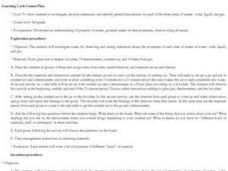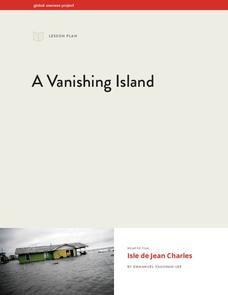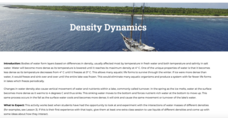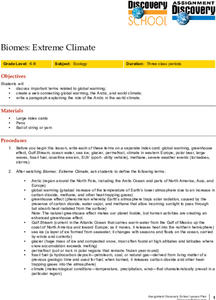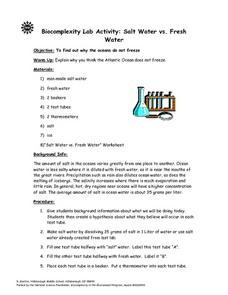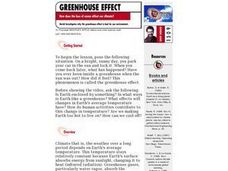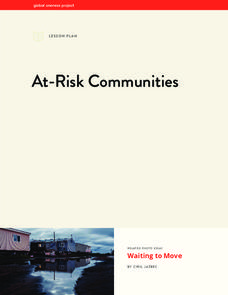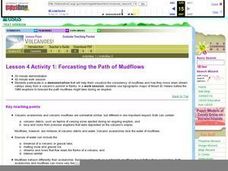Curated OER
Learning Cycle Lesson Plan
students investigate, develop inferences, and identify general descriptions for each of the three states of matter - solid, liquid, and gas. students investigate water, by observing and stating inferences about, the properties of each...
Curated OER
Volcanoes!: Forecasting the Path of Mudflows
Students construct a mockup of a volcano by crumbling up newspapers and piling them into the shape of a volcano. They place a tarp over the newspapers making sure the tarp is large enough to simulate a flat area at the volcano's base....
Global Oneness Project
A Vanishing Island
The effects of rising sea levels on Isle de Jean Charles, located off the coast of Louisiana, are documented in Emmanuel Vaughan-Lee's poignant short video. Viewers are asked to consider not only the plight of residents but also what...
Curated OER
Density Dynamics
Students set up working models demonstrating lake turnover and the formation of deep water masses in the oceans.
Curated OER
Glaciers: Then and Now
A large data table is given to your elementary earth scientists in which they record observations that they make while viewing pictures of Alaskan glaciers. They compare and contrast recent photos with older photos. Hold a discussion...
Curated OER
Biomes: Extreme Climate
Students create a web connecting global warming, the Arctic, and wold climate. They write a paragraph explaining the role of the Arctic in world climate.
Curated OER
The Same But Different
Third graders observe a frozen container filled with ice and discuss what happens when the ice sits out in the room. They practice measuring the mass and volume of the ice, watch as the frozen container is placed in a warm water bath to...
Curated OER
Wet Weather, Wet Climate
Students discover the differences between weather and climate in this long-term lesson introduction. They create rain gauges and practice reading rainfall measurements, view a website showing the cloud cover in their location and draw...
Curated OER
Salt Water vs. Fresh Water
Students explore why the oceans do not freeze. They explain why they think the Atlantic Ocean does not freeze. Students are given background information about what they are doing. They create a hypothesis about what they believe...
Curated OER
How Does the Loss of Ozone Affect Our Climate
Students explore the greenhouse effect and what it does to the environment. They discuss if and how human behavior contributes to global warming and test natural materials for carbon content.
Global Oneness Project
At-Risk Communities
"Waiting to Move," a photo essay by Ciril Jazbec, brings into sharp focus the threats posed by climate change. Class members examine images of Shishmaref Island and the Native Alaskan Inupiate coastal villages that are impacted by rising...
Curated OER
Life in the Freezer
For this global warming worksheet, climatologists examine a few possible results of climate change. There is no specific reading from which learners extrapolate the information needed to answer the questions, so you will need to preface...
Curated OER
Forcasting the Path of Mudflows
Learners visualize consistency of mudflows and how they move down stream valleys away from a volcano's summit. They use topographic maps of Mount St. Helens before the 1980 eruptions to forecast the path mudflows might take during an...
Curated OER
Help Save the Polar Bear
Students use ice cubes to demonstrate how the polar ice caps are melting and how it effects the polar bears. In this polar bear lesson plan, the teacher explains how polar bears live on the north pole and how they are having trouble due...
Curated OER
Cooking Up an Explanation
Students pose scientific questions about food items and research their explanations. They then create recipe cards with the answers and present their findings in a cooking show format.
Curated OER
Changing States: Does it Matter
Young scholars participate in experiments to visualize the differences between chemical and physical changes. They attempt to detect the five characteristics of a chemical change.
Curated OER
Draw a Scientist
Students think to themselves about what a scientist might look like when they're working and then draw a picture of a scientist at work and discuss their drawings. They notice the number of men compared to women and other such...
Curated OER
Exploring Phases of Matter
Students discuss and experiment with the phases of water. In this phases of matter lesson, students recognize the different states of matter. Students measure and record changes and understand when the state changes.
Curated OER
Glacial Climbing
Students plot the current distribution of glaciers around the Earth and see if there any major trends where glaciers appear to be either growing or shrinking at abnormally high rates.
Curated OER
The Water Cycle
Fifth graders examine the stages of the continuous water cycle that exists on Earth. They observe a water cycle model that is set up in the classroom and write descriptions of what they see. As a class, they discuss models of the water...
Curated OER
It's a Matter of Change
Students watch a video on matter and identify examples of solids, liquids and gases in the classroom. They discuss the attributes for each kind of matter and conduct an experiment to explore how matter can change form.
Curated OER
Physical Changes and States of Matter- Two
Third graders explore the concept of evaporation as they observe how the water level changes in a cup that is left out. Working in groups they observe physical changes in a group of everyday items. They record the changes in shape, size,...
Curated OER
Cloudy With a Chance of Meatballs
Fourth graders participate in an activity which introduces them to common types of precipitation. They examine "Cloudy With a Chance of Meatballs" through a teacher read aloud and make a weather pamphlet.
Curated OER
Chilling Predictions
Students research and prepare an almanac on the Arctic. They examine the laws that attempt to provide jurisdiction over this area and consider how these laws be affected if geography of the Arctic continues to change due to global warming.
